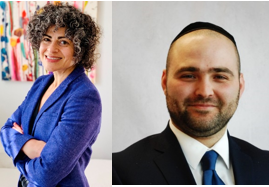
“What Does it Mean to Be One Health Center?”
For the Executive Officer of Oregon’s largest Federally Qualified Health Center (FQHC), this question was at the heart of the search for the health Center’s Chief Clinical Officer and Chief Operations Officer dyad which would help further the Health Center’s goals around healthcare integration, health and racial equity, access, and quality of care for the vulnerable populations they serve.
The FQHC / Integrated Clinical Services (ICS) is composed of more than 22 primary care, dental, and student health center clinics in the Portland metro providing pharmacy services, medical, behavioral, dental, student health, and HIV health care.
As a community health center, Integrated Clinical Services also provides a comprehensive array of supporting services to improve health care outcomes and access. This includes extensive community partnerships, health education, support for fruit and vegetable prescriptions, access to bike shares, yoga and walking groups, and free transportation and interpretation assistance. Their patients represent some of the most culturally and racially diverse communities in Oregon, with more than 100 languages spoken by patients.
The Situation:
While ICS was already looked to as a model for innovation statewide and nationally, there was a desire to push further into a few main areas by hiring a new Health Center Chief Clinical Officer and Chief Operating Officer to lead this complex innovation operations work. All of this in the setting of the pandemic, and eventually post-pandemic recovery.
Needs:
Provide tighter integration of services at each clinic, allowing patients to see multiple providers at once or schedule multiple appointments for different services at one time. In addition, there was a desire to improve the patient experience across all locations, including addressing barriers to care.
The Process:
Acumen interviewed a broad range of stakeholders as well as providers and thought leaders from their own networks to extract insights, gain subject matter expertise, understand the vision/mission/values to develop a strategy to find highly qualified candidates while using an equity lens. They brought forward dozens of highly qualified candidates that met the criteria of the County they related to cultural fit, skills, experience, racial/ethnic equity, education, and other dimensions.
Bernadette Thomas, APRN, DNP, MPH was a natural fit for the Chief Clinical Officer role. She holds a doctorate degree in nursing from Johns Hopkins and masters’ degrees in public health and nursing from Yale University and brings deep experience leading FQHCs as both a Chief Nursing Officer and a Chief Operations Officer. She brings a unique perspective to the organization as an expert in FQHCs and integrated care from both the clinical and operations perspective and brought best practices from leading-edge health centers on the East Coast.
When Fred was asked about working with Bernadette, his response was “We (at the FQHC) are extremely lucky to have her. Her skill set is so unique, and she’s done remarkable work for the organization.”
Bernadette further commented that “healthcare is social justice in action. After the Peace Corps, I wanted to do more to really impact people for the better and I found healthcare to be the social justice work I was seeking.”
Fred Dolgin, the new Health Center Chief Operations Officer at ICS came from serving as the Deputy Chief Operations Officer at Virginia Garcia Memorial Health Center, another large, respected FQHC in Oregon. His passion for the work, technical expertise, grasp of racial and health equity criticality, and humility as a leader was evident from the first interview. He came to the County to have an even broader impact and continue his strong innovation and integration work.
Bernadette expresses great admiration for her dyad partner, Fred who she greatly values working with, as he brings tremendous wisdom and insights as a long-time Oregonian who also relocated from the East Coast.
Early Results
Together, they are working with their co-leaders to innovate and to create an operations plan to advance racial and health equity, as well as operational excellence that meets the needs of the community, the staff, and the patient-led board of directors:
- Increase access to care, today, tomorrow, or the next day
- Comprehensive recall system, to ensure patients get the follow-up care recommended by their provider
- Practice management redesign, to enable more flexibility in scheduling; faster, smarter scheduling, that meets the needs of patients and providers
- Setting the foundation for patient self-scheduling, to ease the burden on the phone lines, to improve patient experience and satisfaction
- Improving access to care and health staff overburden through the creation of nurse triage and transitions care management for those experiencing severe and persistent mental illness
- Increasing patient engagement through the creation of a member services program focused on cross-service integration with equity and cultural competence built into outreach workflows
- Ensuring patients get the care that is intended through referral coordination process improvement
- Developing an Operations Plan that ensures alignment with board-approved Strategic Plan and optimizes execution of work priorities
Working with Acumen
“If I had to identify what separates Acumen, it is a rigorous commitment to person-centered service – they ensure this level of individualization is retained throughout the recruitment process.” – Fred Dolgin
“Acumen offered a highly personalized recruitment process. They truly understood the needs of the organization, and I really felt prepared as a candidate.” – Bernadette Thomas
